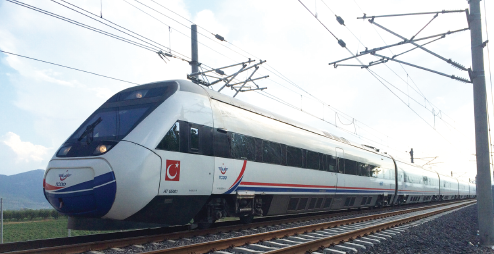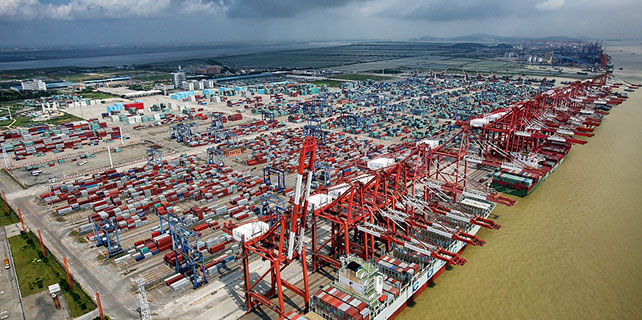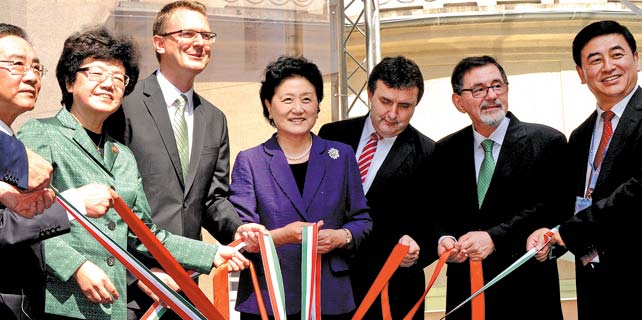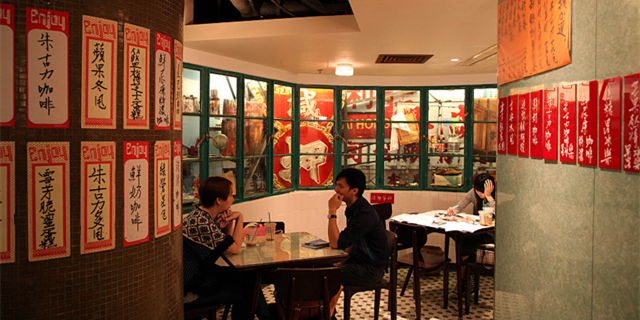Genertec pursues 'strategic shift'
After 3 decades in London, Chinese conglomerate still plays a key role in trade between the two nations
Three decades ago, the state-owned conglomerate China General Technology established a humble office in London to aid the transfer of industrial technologies between China and European economies.
|
 |
|
The railway in Turkey that links Ankara with Istanbul, for which Genertec participated in the construction process. [China Daily] |
Back then, China was in the early days of its economic reform and opening-up, and was still greatly lacking in technology and infrastructure. Genertec played a crucial role in helping the country embark on a fast development path.
Now, the company's focus in the United Kingdom has changed and diversified in tandem with China's maturing industrialization.
It now exports Chinese equipment and materials to the UK, collaborates with British companies on infrastructure projects in the areas targeted by the Belt and Road Initiative, and brings UK heritage brands to China's big-spending consumers.
"Our strategic shift reflects the changing dynamics of UK-China bilateral business relationships," says Wang Yunfu, director of Genertec UK Ltd.
This process of strategic adjustment was by no means easy. As a conglomerate, Genertec's largest business segment is in the infrastructure projects sector, but it has been a long and hard process for China to export its infrastructure to the mature market in the UK.
When Wang arrived in London to head Genertec's UK team in 2014, it was not long after the British government had confirmed the go-ahead of the UK's High Speed 2 railway project.
"I remember we were really excited. We were so keen to participate in the UK's HS2, keen to put into use China's vast high-speed train experience and expertise."
Not only did the possibility of participating in HS2 appeal immensely to Genertec, Wang personally felt the excitement, especially as he had just participated in the construction of the railway linking Ankara and Istanbul as part of the Genertec Turkey team.
He immediately immersed himself in the detailed process of researching the bidding process for HS2, which took eight months. He arrived at the disappointing conclusion that HS2 was not the right opportunity for Genertec.
It was not an act of shrinking away from the challenge but a carefully considered decision, backed by solid research and convincing logic.
"The UK's high-speed train procurement process is complex, because some contracts are procured by various HS2 operators and some by various train-leasing companies, so we would have needed to invest a great deal of energy to build relationships with many players if we had entered the bidding process, and such investment without a definite return might not have been the best use of our resources," Wang explains.
In addition, Genertec's competitive strength in project management and project financing in China and other emerging markets could not be exploited for the HS2 project.
"In emerging markets, we have great expertise in acting as the engineering, procurement and construction manager, to keep a project on time and on cost from a holistic approach, but HS2 will be built in many small phases and by many different partners," he says. "In addition, the fact HS2 is funded by the British government means our access to financing capital could add no additional strength for us in the bidding process."
Given the lack of obvious advantages for the company in the HS2 bidding process, Wang decided to let go of the opportunity in 2015. Since then, Genertec has focused on selling its railway equipment and materials to Western companies with HS2 contracts.
Meanwhile, Genertec is making progress in collaborating with British companies on infrastructure projects within the Belt and Road area, where it works as a project coordinator, linking the expertise of other Chinese construction companies with British management companies and engineering consultancies.
"Often, the Chinese companies can contribute their construction expertise accumulated through China's large number of projects. British companies can contribute their management expertise and understanding of local cultures, especially in countries that were once British colonies. Our involvement can help different parties better understand each other," Wang says.
Genertec's history can be traced back to the establishment of the China National Technical Import and Export Corp in 1950, which was then a key State-owned enterprise that mainly focused on technology trading, project contracting and management, and other integrated services. In 1998, when Genertec was formally established, CNTIC became a wholly-owned enterprise of Genertec.
As a conglomerate, Genertec's activities are roughly divided into five areas-equipment manufacturing, trade and engineering contracting, the pharmaceutical industry, technical services and consultancy, and construction and real estate.
Globally, it employs about 50,000 people across 58 organizations and 32 subsidiaries. Three of its wholly owned subsidiary companies are listed on the Shanghai stock market. Last year, the company's revenue reached 150 billion yuan ($22 billion; 20.5 billion euros; £17.15 billion) and its profit was 5 billion yuan.
Genertec's operations across so many sectors give Wang's team great flexibility to expand its UK operations.
"In recent years, Genertec has increasingly expanded its pharmaceutical and medical industries' activities due to the huge demand created by China's aging population and second-child policy, so in the UK we're looking for healthcare opportunities too," Wang says.
In particular, his team has spent a considerable amount of time in recent years investigating British medical companies that Genertec might want to invest in as equity partners, so it can take products and expertise into the Chinese consumer market, or help commercialize pioneering British medical technology in China.
"We are yet to find the suitable target but we feel, strategically, this is very important as a business area, judging by China's huge market demand," Wang says.
More recently, Genertec has embarked on a new business opportunity-importing British branded products into the Chinese market, through both e-commerce and traditional trade channels. Wang's team has chosen the British heritage brand Hampstead Tea as the first such product.
"The idea occurred to us quite recently. Because our other business segments all focused on large-scale projects that often cannot achieve concrete outcomes immediately, we were thinking about what other opportunities we could spot in the foreseeable future. We then realized we have so much strength in importing, built over more than 30 years, so we decided to return to this area of our traditional strength."
Unlike the situation 30 years ago, Genertec is importing consumer products, not industrial pumps.
Holding a box of Hampstead Tea in his hand, Wang has high hopes.
"Given China's strong reputation as a tea-producing nation, it may at first seem crazy to be importing tea into China, but what we've noticed is a demand for British heritage brand tea in China, especially among young middle-class consumers who prefer teabags to tea leaves for their convenience," Wang says.
The brand was founded in 1989, and markets itself as a champion of organic, fair trade tea. In the UK, it sits among the affordable tea range, retailing at about £3 ($3.80; 3.5 euros) for a box. Wang says it will retail for about the same price in China, where there is strong demand for an affordable tea with guaranteed quality and taste.
"As a state-owned enterprise, we are not aiming to create massive profit margins. Rather, we hope to bring great products to Chinese consumers. Our reputation as a trusted importer can help consumers have peace of mind when they drink the tea we import," he says.
The tea has been certified by the China Certification and Inspection Group, another State-owned Chinese company, which has been in the UK for 20 years.
Wang says it is important in his job to be able to talk about high-speed rail and industrial pumps in technical terms, and also be able to enthuse about drinking tea.
Born in Hebei, Wang studied English at Xiamen University and, upon graduation in 1988, he joined Genertec. During his 29 years with the company, he has rotated through many different departments, which has equipped him for his current role in London, where he leads a small team that handles business in diverse sectors.
His days are long and challenging.
"My days start very early, as I'm trying to communicate with headquarters colleagues in the morning, before getting to a full day of work. As an expat, I'm available to take on additional tasks whenever my job needs me," he says.
"I've learned so much from my job, and it is great to participate in a team that can help play a strong role in China's economic development and China's business relationships with so many of its partners internationally," he says.
Genertec UK Ltd
Industry: Conglomerate with a focus on advanced equipment and technology
Year of entry into the UK: 1988 Address: 23 Collingham Road, London, SW5 0NU
Parent company in China Genertec
Industry: Conglomerate with a focus on advanced equipment and technology
Year of founding: 1950 (formerly China National Technical Import and Export Corp, restructured as Genertec in 1988)
Address: F23-28, Genertec Plaza, No.90, Xisanhuan ZhongLu, Fengtai District, Beijing, 100055






















